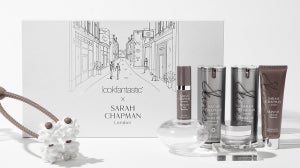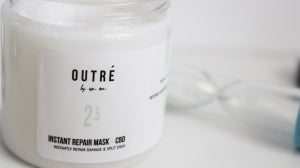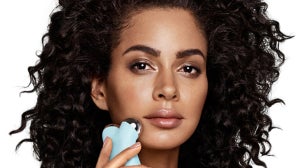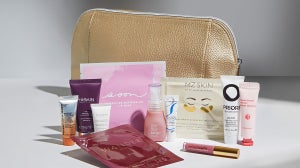One of the most searched for ingredients in skincare, most of us have heard of retinol. However, despite seeing it everywhere you go, both online and in store, and possibly even having used it already, not many of us are sure what it does, when we should use it and why. We're hear to give some clarity on this skin clearing superstar so that you can properly incorporate retinol into your routine.
Winner of the Glamour Power List 2020 Best Retinol Product, the Retinol Ceramide Capsules Line Erasing Night Serum by Elizabeth Arden is a powerful but gentle formula that delivers smoother and younger looking skin. Encased in single does capsules, the serum is easy to apply and protected from light and air which can compromise the efficacy of the Retinol.
What is Retinol?
Predominantly made up of Vitamin A, retinol is a type of Retinoid that is available over the counter and in our skincare products. Retinoids work by helping to stimulate cell turnover, helping the skin to product collagen at a healthy rate which keeps skin renewed, plump and youthful, helping to prevent and reduce fine lines and wrinkles. They also can be effective in treating acne and blemishes, helping to clear pores and regenerating cells to reveal healthy skin.
What does Retinol do for your skin?
Because of its ability to encourage cell turnover, retinol is one of the best ingredients you can use for rejuvenating the skin; this in turn helps generate a multitude of benefits targeted towards all major skin concerns such as
- Anti-aging - retinol helps the skin create new cells to refresh the complexion to leave you with a plumper and smoother visage.
- Acne & blocked pores - retinol helps un-block pores and repair blemishes to eliminate acne, blackheads and whiteheads.
- Scarring - the cell turnover encourages healthy, un-scarred skin to replace the scarring which retinol will help to fade.
- Uneven skin tone - retinol can help to remove unwanted uneven patches of skin.
- Dull skin - new, young skin means brighter and glowing skin.
When to use Retinol
Retinol should always be used at night and never in the morning. This is because it exposes new layers of the skin which are more sensitive to sun damage which can in turn do more damage than good. Use your retinol product after a gentle cleanser in the evening and before moisturizing. If you have particularly sensitive skin, use a serum or moisturizer before your retinol to keep it hydrated and reduce irritation. Whether you've used retinol or not, it is advised you should wear SPF every day, however it is particularly important to make sure you apply at least factor 15 the morning after using your retinol product as your skin will be more sensitive to UV rays.
How long does it take for Retinol to take effect?
It can take anywhere between four to six weeks for you to start seeing the benefits of using retinol. Though you may see an initial glow after using for a few days, the real anti-ageing and skin clarifying benefits require a little more patience and can taken up to four months for the complexion to be fully improved. Therefore it's important to keep using your retinol on a regular basis, working up to a stronger percentage based on your sensitivity levels to see an even bigger improvement.
What are the side effects of Retinol?
As retinol is an incredibly potent and effective ingredient, it does come with some side effects, including dryness, redness and irritation. This can indicate that it is doing its job, however monitor the level of sensitivity that you see and reduce the percentage of retinol you are using accordingly to make sure that you aren't over-powering your skin. Because of the sensitivity that retinol creates, it's advised that you don't use strong acids or peels a the same time to avoid damaging the skin. As mentioned earlier, if you are experiencing irritation with using retinol, try applying a lightweight moisturiser before your retinol to act as a buffer on the skin.
Who should use Retinol?
Though retinol is a powerful anti-ager, it's all about prevention when it comes to wrinkles. Therefore it's recommended that you start using retinol in your mid-twenties, when those pesky crows feet often start to appear, to stop them in their tracks. However, if you are using retinol for acne, you may want to start earlier (note that it is not suitable for children).
Due to the side effects it can cause, retinol often isn't recommended for those with extremely sensitive skin or anyone who suffers from a sensitive skin condition such as eczema or rosacea. Instead, try using a more gentle ingredient such as Bakuchiol, which also has effective anti-ageing properties.
Shop all retinol products on LOOKFANTASTIC here.







